Why bringing down the interchange will save rugby league from itself
There was a moment in State of Origin III when Damien Cook took off from dummy half in that showed what rugby league needs to do to save itself writes PAUL KENT.
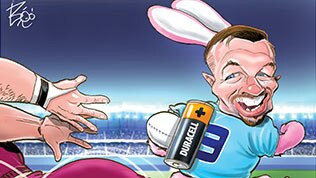
Blues
Don't miss out on the headlines from Blues. Followed categories will be added to My News.
JOURNEY: The twin paths of Smith and Marshall
MIRACLE: Inside a moment of Origin history
Nearly an hour into Wednesday’s Origin Damien Cook made a statement for the game.
It was for better days and a future worth building.
Cook got out of dummy half and shaped outside but swerved inside and, “slithered through” the Queensland defence, said Ray Warren in commentary, and he was away and gone.
It was simple brilliance. Tired markers and a slow moving A defender was all he needed to push the Blues ahead 20-8.
Paul Vautin threw to Andrew Johns on the sideline and what Johns said next should be written in neon.
“Well there’s been one penalty in the second half so the game has flowed and, what’s happened, fatigue has come into the game,” Johns said.
“There’s no surprise that the two best players for NSW have been Cook around the ruck and Tedesco.”
Johns’s comments are worth unpacking.
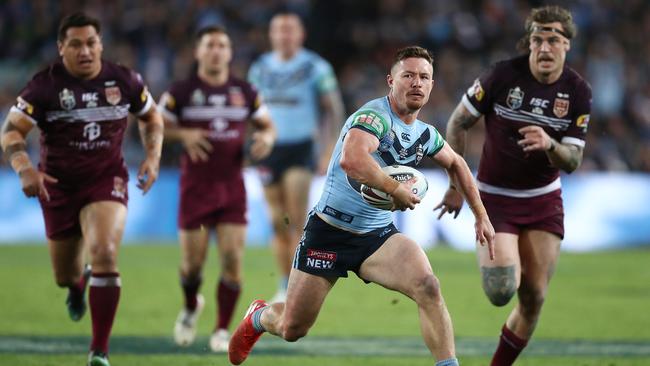
Johns attributed Cook and Tedesco’s emerging brilliance to fatigue entering the game. Fatigue occurred because the referees were blowing less penalties, so there was less stoppages, so the players had less time for rest.
The less rest meant they grew tired and, with fatigue, more opportunities arose on the field and the better players, like Cook and Tedesco, were able to exert their supremacy.
There is nothing to dislike in any of that. Who doesn’t want a game where the better players are able to display their superior skills?
Such moments are when the game finds its greatest heights. They build television ads around such moments.
They sell Origin on this very premise.
So why can’t the game do it more often?
The obvious answer, to achieve this, is to blow less penalties.
Follow the Johns explanation; less penalties, more fatigue, better football.
And there is certainly a section of the game’s community who advocate for less penalties. Coaches lead the charge, so the calls appear to have authority, and their yelps pick up a few voices in the commentary.
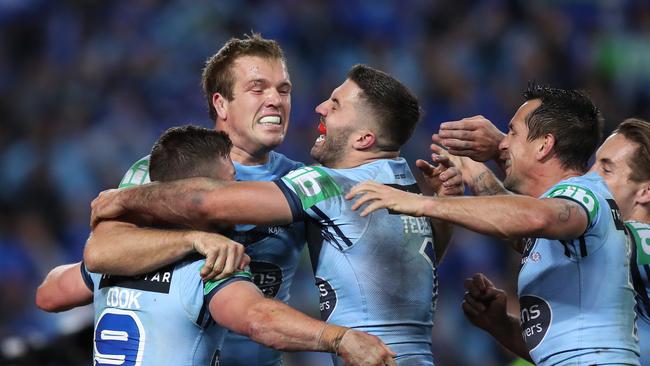
But coaches have an agenda the game refuses to recognise, while others fail to realise. The one thing coaches always fight hardest for is control. It is how they remain employed. Poor players unable to deliver the coaches instructions are quickly moved on.
So it might be possible their call for less penalties, and a more open game, is merely their Trojan horse.
Their enthusiasm for less penalties is less about introducing fatigue into the game than allowing them to come through the side door and coach spoiling tactics to slow the game down in defence.
Lay on the tackled player, hand on the ball, stand off-side … all to give their team a breather, knowing the referees won’t be hard with the penalties.
The reasons are simple enough.
It has long been regarded that those who win the ruck win the game. Where once good coaching meant making the tackle and getting off quickly to get back in the defensive line coaches, encouraged by the referees’ reluctance to penalise them, discovered the opposite is in fact true.
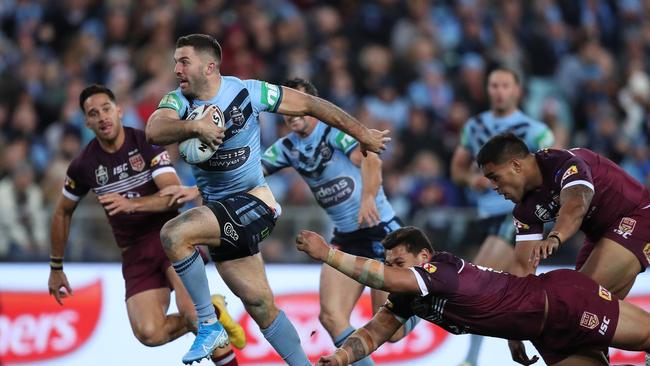
A slow play-the-ball allows more rest, less fatigue, and so less mistakes. So all kinds of wrestling moves to slow down the play-the-ball, while making it look like they were trying to move fast, were developed.
Referees have tolerated it, conned by the appearance that there is movement to get off the tackled player when the reality is the players they are doing all they can to merely appear like they are trying.
And if the referee is aware of the con then the external pressure to blow less penalties has cowered them into putting the whistle away for fear of “ruining” the game.
Once that has happened defence will dominate and they will wrestle like alligators. Teams will be so off-side they could shake hands. Who exploits the rules best will win.
It is no coincidence Melbourne, the NRL’s best wrestlers, are three wins clear at the head of the competition. The rest are playing catch up, in the tackle, and so on the ladder.
Origin is traditionally more open because Origin camps don’t traditionally allow time for the Origin coaches to nail down their wrestling techniques.
It is a version of the game nobody prefers but few are prepared to address.
So how does rugby league encourage more open football, where the skilled players come to the fore and are not dulled by stifling defence, in week to week NRL games?
The simple answer, we see, is not to blow less penalties.
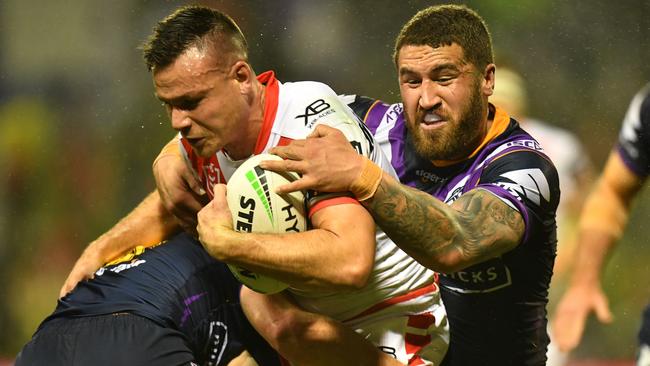
In the NRL, unfortunately, it seems to be standard practice for coaches to find their way around any rule or interpretation in the game
Except one.
The one part coaches can’t coach against is fatigue. The very same fatigue Andrew Johns spoke to in Origin.
If the game can’t introduce fatigue through one means, a more free flowing game, then why not another?
In recent years the game has forced introduced changes into the game to force fatigue. Shot clocks on conversions, goal line dropouts and scrums were all introduced to encourage what the game once did organically.
All have helped, minimally. The wonder being the NRL has congratulated itself each action
How long until the game begins bringing the interchange down?
It should have happened last month but for suspicious reasons the NRL competition committee, driven by the coaches and players association, voted to keep the interchange at eight.
LISTEN! Matty Johns and the crew reveal their all-time Origin 17s, delve into the best rugby league gee-ups and focus on a couple of players struggling to live up to their reputation.
It was claimed afterwards that a decision was made after a unanimous vote, even though no vote was taken.
This in itself leads to suspicion the decision was predetermined. That for reasons the NRL will not explain, perhaps because it is being bullied by coaches and doesn’t have the intellectual nous to challenge their version, the NRL went with the coaches preferred version.
The game improved considerablely when interchange was dropped from 10 to eight, same as it did when it dropped from 12 to 10.
In each case the interchange was lowered after coaches got their players fitter and so able to stay in their defensive systems longer, although there was a notable drop-off in three-man tackles after the most recent drop.
The obvious answer is to bring it down again.
If Origin did not reveal that, what else do the decision makers need?
MORGAN PROOF OF NRL’S INACTION ON CONCUSSION
Michael Morgan’s worrying knockout in Origin III should demand an urgent review of the NRL’s concussion protocol.
Morgan was left heaving on the ground after copping friendly fire from teammate Josh McGuire, wrapping around in a tackle and colliding with McGuire’s arm.
While it was first accepted that Morgan crashed into McGuire’s elbow some now believe Morgan instead collided with the fleshy part of McGuire’s arm which makes the concussion more worrying.
It is worth remembering that Morgan was knocked out and replaced in his previous game against St George Illawarra.
Since Luke Keary was stood down by the Sydney Roosters after several knockouts, before making a successful comeback last weekend after six weeks out, focus around the game has been on the ramifications of the second knockout.
The Roosters stood Keary down on the advice that knockouts take about four to six weeks for a full recovery and that, even though there was no physical evidence of damage, to rush him back would increase his chances of a second knockout.
Morgan received no such consideration and was knocked out again in what looked a fairly innocuous incident last Wednesday.
Boxing mandates that fighters knocked out are banned from fighting for three months. While it would be devastating for the NRL to adopt a similar stance the growing worry over concussion syndrome, combined with a lenient concussion protocol, could only find more trouble.
